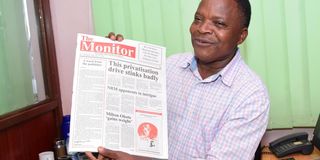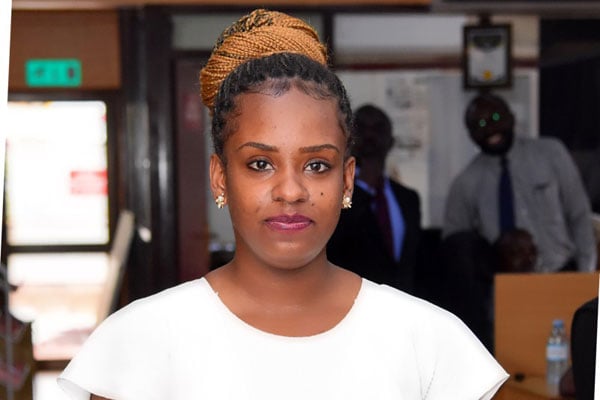Prime
Why I have served Monitor Publications for 30 years

Mr David Mukwaya, Senior Office Manager Monitor Publications Ltd with the first copy of The Monitor. PHOTO/FRANK BAGUMA
What you need to know:
As Monitor Publications celebrates 30 years of existence, Precious Delilah talked to Mr David Mukwaya, the longest- serving employee about what it has been like to work at the paper for all those years
When did you join the Monitor?
I joined Monitor on the very first day. If memory serves me right it was July 24, 1992. I accompanied the founders when they were going to negotiate for a place to establish The Monitor offices.
Describe your first day/week at work.
My first day was exciting yet challenging, because I had to work without knowing what the future held. I had to work with no pay, no food, and no transport but I decided to brave the hard times and be positive.
The first week was hard because there was a lot of work to do yet very few people, but it was rewarding when we sold our first copies on Entebbe Road.
Where were Daily Monitor’s first office premises?
My bosses had so many friends, so when one of them (Wafula Oguttu) told one of his friends that he wanted to start a newspaper but didn’t have offices, the friend asked him if he could use the basement of his company building. So we went along with the founders to Entebbe Road, the current Kamu Kamu Plaza which was Uganda Cement Corporation building in the early 90s.
When we saw the place, we decided to occupy it and I started setting it up. We started with about two chairs and one desk. Most of the founders got furniture from their homes.
Who were the founders you started with?
They were Wafula Oguttu, James Serugo, Charles Onyango Obbo, Richard Tebere (deceased), Kevin Aliro (deceased), Teddy Ssezi Cheeye (deceased) and David Ouma Balikowa.
What was your first position at Daily Monitor?
When I had just started I had many responsibilities. I didn’t have a contract that stated my position so I worked as an office aide. I was a receptionist as well as the dispatch clerk.
When we got appointment letters, I was given the position of office aide. I then rose to office administrator, office manager, and later to senior office manager.
For how long did you work without a contract and salary?
The first four months and were tough, but I believed the founders had a vision. After those months, we started getting weekly facilitation of about Shs25,000.
How did you survive without any income?
By then I had started a small bread business and I had kept some little money. Secondly, I was staying close to the office premises so I would wake up early morning and walk to office. When we started earning the weekly facilitation, I saved until I bought a bicycle which I rode to work.
What does it feel like to be the longest-serving employee?
It feels great, I’m so happy and grateful that I had a chance to be part of Monitor Publications journey. When something bad happens at Monitor Publications, I feel so bad because I have seen this company from its humble start.
What has changed in the company since you joined?
The company has grown and there has been a lot of change. Monitor Publications used to be like a family group which I believe it is no longer the case. We were so close to each other that when one was sick or had a problem we would all know and be there for that person. Today with the big numbers of employees, one can fall sick or get in trouble and no one will even know because we no longer have that family spirit. Maybe the current cultural transformation that we are undergoing will bring that back.
On a positive note, there are changes I didn’t see back in my early days such as employees being able to negotiate their salaries. For us in our days whatever you were given, you said “thank you” and left before they changed their minds.
Also, Monitor Publications has grown from being just a small office to owning several plots of land, having branches and nine bureaus across the country.
What has been your favourite moment at Monitor Publications?
I have been being able to develop as an individual. In 1994,I found a piece of land and wanted it so badly that I came back to office and talked to my bosses about getting a loan. They accepted and gave me the money to buy it that was my happiest day because I was tired of paying rent with the little money I was earning.
What have been your most difficult moments at the company?
My most difficult moments have been when I see the people I have worked with leave. One day I looked around and all the founders had left.
moment was when the restructuring in 2018 happened. Many of my colleagues left and I survived. But it was hard to readjust.
What is that one thing you are grateful for that Monitor Publications has done for you?
I have been able to grow as an individual. I have been able to build my home, pay school fees for my two children up to university and take care of many dependants. I will always be grateful to to this company.
What is one thing you can tell us about Monitor that most people wouldn’t know?
When we produced our very first copies of The Monitor, we sold all of them but my bosses asked me to keep five copies which I did. The copy of the very first paper, which was reprinted on August 1st, was kept and provided by me.
Why have you stayed with Daily Monitor this long?
I’m very happy and comfortable here. Besides at my age, I can’t now start going to people’s receptions with envelopes looking for a new job. So aside from my businesses I enjoy working at Daily Monitor.





